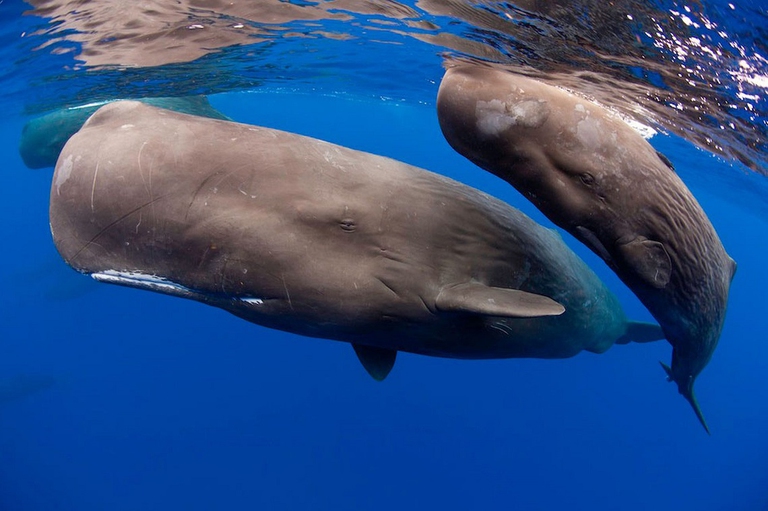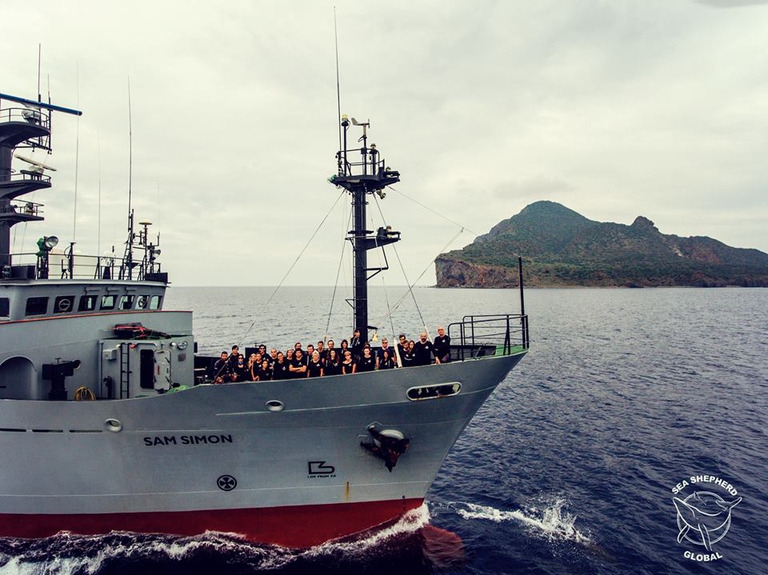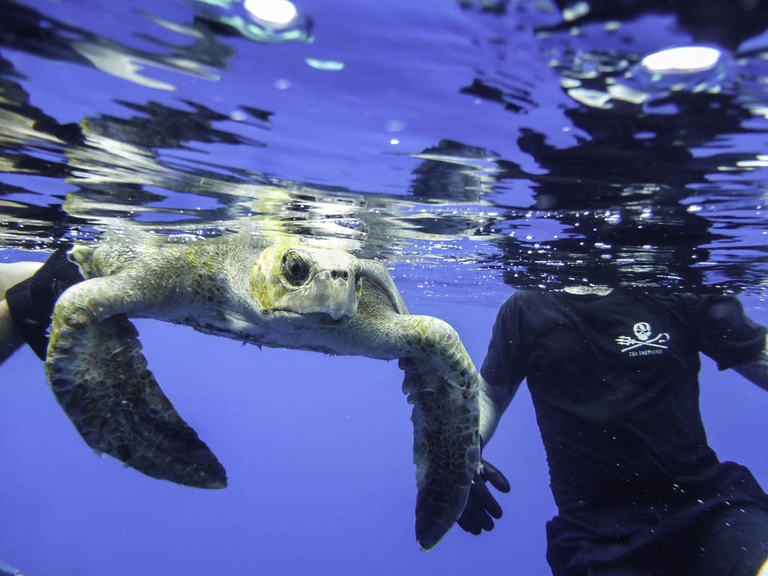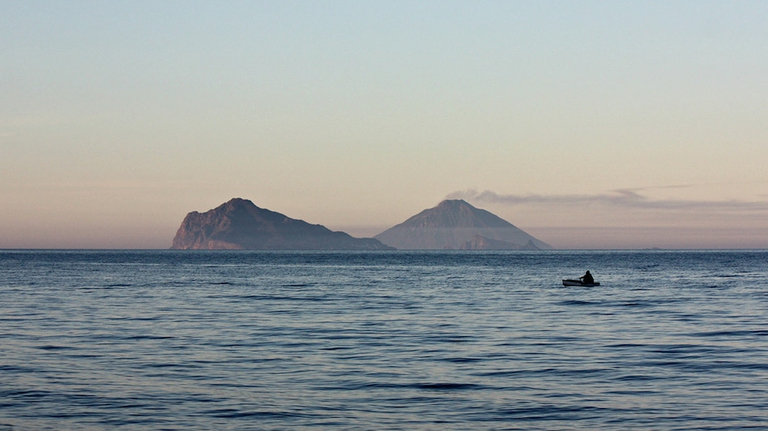
A group of experts in Tokyo suggested pouring radioactive water from Fukushima into the open sea. A marine biochemist explains the consequences of this absurd decision.
130 chilometri di reti illegali tolti dal mare. L’ultima campagna di Sea Shepherd nel Mediterraneo è stata un successo, in nome del capodoglio Siso ucciso dalla pesca illegale e dalla plastica. L’editoriale del presidente di Sea Shepherd Italia.
In 2017, while crossing Italy’s Aeolian islands archipelago, a young sperm whale remained entangled in an illegal fishing net. The Coast Guard spent many hours struggling to free him but couldn’t save his life in the end. He was found dead along the coast of Milazzo Cape, with the net still coiled around the tail fin and with the stomach filled with plastic, by marine biologist Carmelo Isgrò who still today is conserving the skeleton to show it as a warning for all of us and the future generations on the damages we are causing to the environment. Carmelo decided to call the sperm whale Siso, in honour of a dear friend of him who helped retrieve the sperm whale, and who died in a car accident in those same days.
Siso’s death due to an illegal drift net is a clear signal of the presence of illegal fishing gear in the Aeolian archipelago. Moreover, data from the Ministry of Agricultural, Food and Forestry Policies for 2018 confirm that 180,815 kilograms of illegal catch have been confiscated with a total of 7,649,914 euros of sanctions applied. It became impossible for Sea Shepherd not to intervene, so we decided to do it with the support of the Aeolian Islands Preservation Fund and Smile Wave.
The strategy of the operation included two vessels: the Sam Simon and an undercover ship. The latter reached the area earlier beginning the monitoring of the eastern area of the archipelago, while the M/V Sam Simon was arriving from North and going towards South-West.
We left the Molo Italia in La Spezia on 2 October aboard the M/V Sam Simon with a purpose in mind: locate the illegal fishing gear and driftnets in the Aeolian Islands. The vessel was ready after four months on dry berthing, yet on day two it has been through the ringer: an increasing Sea State 5 that made it go through a violent storm coming from North-East.
It was dawn when we reached the area north of the wonderful Alicudi island and we have been welcomed by a pod of dolphins coming to cheer us and bringing a calmness to the sea that allowed us to promptly locate the first plastic jerricans tied and anchored to a 3,000 metre deep seabed: the illegal FADs (Fishing Aggregating Devices).
Read also: The story of Sea Shepherd, in Captain Alex Cornelissen’s words
In agreement and coordination with the Coast Guard, direct action sprang immediately: at 8.45am we hoisted aboard the first illegal FADs. From that moment on we started to locate and map on the GPS dozens of FADs which represent a real danger, even for turtles that most of the time remain entangled without the chance to break free, heading to certain death.
After two days of unrelenting efforts, the sea reinforced taking us inside the archipelago in the marine area in the South of Filicudi, a new area to patrol. At 9am something unexpected happened: in our binoculars, ready to spot potentially illegal fishing gear, a strong and recognisable puff appeared and then another! A wonderful sperm whale came to visit us, as if he wanted to join us in our search for SISO and the nets that killed him. It was him that brought us to the immediate sighting of dozens of other illegal FADs. These illegal FADs threathen both the life in the Mediterranean and the local legal fishing.
The results of 12 days of unrelenting direct action are 130 kilometres of polypropylene line and 1500 metres of fishing line of big thickness without hooks removed from the sea, and a total of 68 illegal FADs confiscated and several plastic bottles, some of them still containing polluting material.
The strategy of the operation turned out to be successful when two fishing vessels, at the sight of the Sam Simon, tried to distance themselves in order to fish illegally using the FADs. Our undercover sailing boat intercepted their route and, using the most powerful existing weapon, the camera, filmed them. Thanks to this, the Coast Guard and the Italian finance police have been able to intervene with investigations which are still ongoing.
Read also: Aboard the Sea Shapherd’s Sam Simon, meeting its crew
With the arrival of the sailing boat in Anzio harbour, Operation Siso 2018 ended with the success and effectiveness typical at Sea Shepherd, confirming the huge presence of illegal FADs: over 5,000 in the South Tyrrhenian Sea for an estimated total of 10,000 kilometres of illegal gears put into the sea every year.
Thanks to the support of the Aeolian Preservation Fund and Smile Wave, the collaboration with local communities has been perfect and during the stops at Lipari and Salina a lot of children and students came onboard. We also received onboard the representatives of the Aeolian artisanal fishermen that will cooperate with Sea Shepherd in order to increase the effectiveness of the next campaigns, and to defend with us this heavenly archipelago, with the purpose of creating a protected marine area which may lead to total protection, opening also the path towards the sustainable Blue economy in an ecological coexistence among species.
Read also: Captain Paul Watson on the laws of ecology, for the survival of the human species
In memory of Siso, reinforced by the passion of our volunteers and the support of all the people who will help us, we will come back to the South Tyrrhenian against the illegal, unreported and unregulated fishing (IUU) and against the use of plastic. Lining up with the “bow towards the sea” with the biggest private fleet in defence of the life of those we call “our clients”, the inhabitants of the Oceans, our thirteen ships are positioned in almost all the seas of our planet.
The most important weapon that makes the difference is the passion of individuals, the passion that encourages to not turn the back in front of illegality and cruelty but to fight them with direct action, without leaving neither plastic nor cruelty behind, but the sense of sharing and respect for all lives.
Siamo anche su WhatsApp. Segui il canale ufficiale LifeGate per restare aggiornata, aggiornato sulle ultime notizie e sulle nostre attività.
![]()
Quest'opera è distribuita con Licenza Creative Commons Attribuzione - Non commerciale - Non opere derivate 4.0 Internazionale.
A group of experts in Tokyo suggested pouring radioactive water from Fukushima into the open sea. A marine biochemist explains the consequences of this absurd decision.
The decline in grey and humpback whales in the Pacific and Atlantic Oceans has been traced to food shortages caused by rising ocean temperatures.
The United Nations has launched a major international alliance for ocean science, undertaking a mission close to all our hearts.
The cargo ship that ran aground off the coast of Mauritius on 25 July, causing incalculable damage, has split in two and its captain has been arrested.
The largest coral reef in the world is severely threatened by climate change, but researchers are developing strategies that could contribute to saving the Great Barrier Reef.
Seychelles have extended its marine protected area, which now covers over 400,000 square kilometres, an area larger than Germany.
Norwegian oil giant Equinor had pulled out of drilling for oil in the Great Australian Bight, one of the country’s most uncontaminated areas. A victory for activists and surfers who are now campaigning for the area to be protected forever.
30 per cent of the planet needs to be protected to stop precipitous species decline. The UN has set out its aims for the the COP15 on biodiversity scheduled for Kunming, China in October.
Ocean warming has risen to record highs over the last five years: just in 2019 the heat released into the world’s oceans was equivalent to that of 5-6 atomic bombs per second. The culprit, no doubt, is climate change.











